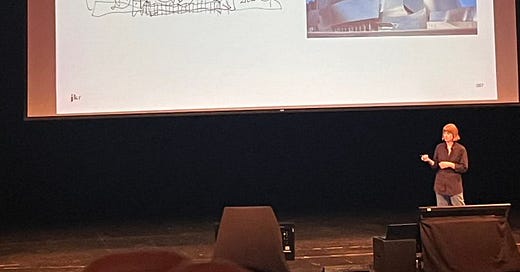!!! sorry about these. They’re intended to attract your reader, but my eagerness led to excess. We’re all infected with the end-result thinking, especially now. I will save you from all the reasons why. But this has led to some sneaky bad stuff for the writerly and squiggly among us. We expect our creative endeavors to be instant.
The sublime, though, is only encountered through process. It’s not in reading our work where we are transformed, but in those tedious minutes or hours when we are culling, or thinking, or shaping whatever the format is.
It’s why so many writers don’t mature. They want to be published more than they want to dawdle. A few months ago, I went to a creative conference and it was excellent to see a peak under every designer and strategist’s creative process. A designer showed us this slide. You are here, the slide says.
The presenter, a designer, uses this image to calm down CFOs and MUST SHOW RETURN ON INVESTMENT energy, but guess what? Calms me down just the same. You don’t get to the masterpiece without the scribble scrabble. By the way, this phrase from kindergarten (much like the phrase nananana boo boo you can’t catch me) pops into my head frequently.
Plus, if you’re in a rush? You’re going to make something… bad.
And outcome-focused creative process results in artifice, not art. Donna Tartt, who famously publishes a book every ten years, recently wrote about this very thing. How can anyone encounter and deliver the sublime, that is, what exists with its own conscious, beyond any petty delineations, without good, old-fashioned time: long hours, meditation, procrastination, that new conversation with an outsized intellect. I swear, after one 30-second conversation with Camille, all of a sudden I realize some scene somewhere should, no, must swerve.
But if true art is an instrument for transcendence and cognitive freedom, then artifice—art’s look-alike—is a homogenizing force that blocks off possibilities and alternate modes of being. —Donna
Listen to her.
The quickest way to make something that doesn’t reach higher, beyond good and evil, beyond well-tried paths, is through thinking about the end. Don’t think about that word count, or the bound product with the Canva-ass cover you’re going to have no control over. Most writers hate their books, once they’re done, anyway. Even Joyce didn’t want to talk about Ulysses.








<3